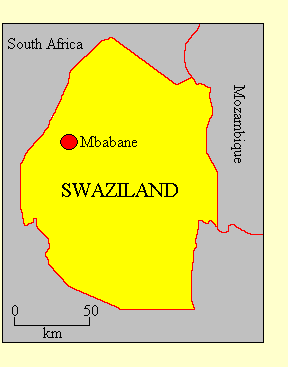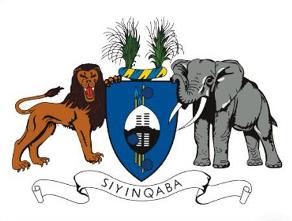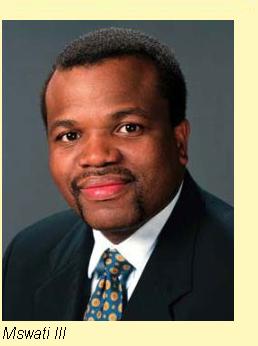

KINGDOM OF SWAZILAND
• Official name: Umbuso WeSwatini (Kingdom of Swaziland)
• Location: Southern Africa
• International organisations: African, Caribbean and Pacific Group of States, African Union,
Commonwealth of Nations, Non-Aligned Movement, United Nations, World Trade Organisation
• Borders: Mozambique, South Africa
• Coastline: None
• Land area: 17,363 Km2
• Population: 1,200,000
• Annual GDP (PPP) per capita: US$4,400 (2009 CIA estimate). World ranking: 121
• Ethnicity: Almost the entire population are Swazis. There are small minorities of Europeans and Indians.
• Languages: English and Swazi are the official languages, but English is the language of government and business.
Most of the population speaks Swazi.
• Religion: About 40% of the population are followers of Zionism, a blend of Christianity and indigenous
ancestral worship. Catholic Christian 20%, Sunni Muslim 10%.
• Form of government: Monarchy. Lesotho is divided into four districts.
• Capital: Mbabane (the King resides at Lobamba)
• Constitution: The
Constitution of Swaziland came into effect on 14 November 2003.
• Head of state: King Mswati III
came to the throne on 25 April 1986.
• Head of government: The Prime Minister, usually a member of the Royal family, is appointed by the King and
accountable to him.
• Legislature: Swaziland has a bicameral legislature, the Parliament (Libandla), which does not have a
website. The House of Assembly has
65 members, 55 elected fromn single-member constituencies and ten appointed by the King for five-year terms.
The Senate has 30 members, ten appointed by the House of Assembly and 20 appointed by the King. The Parliament's
functions are advisory only.
• Electoral authority: None known
• Freedom House 2009 rating: Political Rights 7, Civil Liberties 5

Political history
The Swazi people migrated into their present territories from what is now Mozambique in the late 18th
century. During the 19th century the Swazis came into contact with British and Dutch settlers and lost most of
their lands to them. Swaziland came under the control of the Transvaal Republic in 1894, but after the
Anglo-Boer War it became a British protectorate in 1902. When the Union of South Africa was formed in 1910, it
expected Swaziland, along with Basutholand (Lesotho) and Bechuanaland (Botswana), to be ceded to it, but the
British were reluctant to allow these territories to come under White rule. In 1944 the British recognised the
Swazi Paramount Chief Sobuzha II as King of Swaziland. In 1967 the Kingdom was granted internal self-rule and
independence followed in September 1968.
Independent Swaziland inherited a parliamentary system from the British, but this was abolished by the King in
1973. Since then Swaziland has remained firmly under the control of the Dlamini dynasty. There was a period
of instability after Sobuzha's death in 1982, but since 1986 King Mswati III has run the country as a personal
fiefdom. There has been no independent Parliament or legal political opposition since 1977. The opposition
People's United Democratic Movement (PUDEMO) operates illegally.
Freedom House's 2009 report on
Swaziland says: "Swaziland is not an electoral democracy. King Mswati III is an absolute monarch with
ultimate authority over the cabinet, legislature, and judiciary... Corruption is a major problem. The monarchy
spends lavishly despite the largely impoverished population... Swaziland was ranked 72 out of 180 countries
surveyed in Transparency International's 2008 Corruption Perceptions Index... Freedom of expression is severely
restricted in practice, especially regarding political issues or the royal family. The king may suspend
constitutional rights to free expression at his discretion... The government has restricted freedoms of
assembly and association, and permission to hold political gatherings has often been denied... A dual judicial
system includes courts based on Roman-Dutch law and traditional courts using customary law. The judiciary is
independent in most civil cases, although the king has ultimate judicial powers, and the royal family and
government often refuse to respect rulings with which they disagree."
UpdatedJune 2010
|

